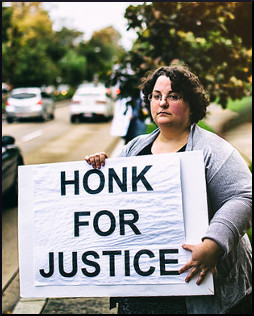
Currently, the House the Homeless home page shows a letter by founder and President Richard R. Troxell, explaining why he wrote an Amicus Brief with the intention of helping the situation in Austin. Many cities throughout the United States currently operate under rules that can only make homelessness worse.
As Richard points out, one factor that helped turn Ferguson, Missouri, into a battle zone in 2014 was a local economy based on money extorted from the people by hyper-zealous law enforcement. Americans who are the least able to afford additional debt are overcharged and over-convicted every day, to the detriment of honest and stable civic peace.
National Public Radio’s Joseph Shapiro recommends his network’s series, titled “Guilty and Charged“:
The series reported that nationwide, the costs of the justice system are billed increasingly to defendants and offenders, and that this creates harsher treatment of the poor. Because people with money can pay their hundreds or thousands of dollars in fines and fees right away they are usually done with the court system.
But in many places, people who live on the edge of solvency are subject to a daily effort to extract a constant flow of dollars from them. Shapiro wrote in another piece:
In 2013, the municipal court in Ferguson — a city of 21,135 people — issued 32,975 arrest warrants for nonviolent offenses, mostly driving violations.
Do we have rulings and protections in place to prevent what is, to all intents and purposes, the return of the medieval debtors prison? Of course we do, but when people are ordered to show up physically to make their monthly installment payments judges can do crazy stuff like order the courtroom locked, and then issue an arrest warrant for a person who was barred from entering.
Or maybe the person just lives too far away and can’t get a ride. Additionally, in Ferguson and places like it, the insanity is mixed in with a huge propensity toward racial profiling.
Land of the unfree
Throughout the U.S. there are many pockets like St. Louis County, with courts notorious for charging outrageous fines and fees. The more petty the crime, the better, because legal defense requires even more expenditure. Unless a person is charged with rape or murder putting up a defense is just added punishment.
Even an employed person can sink under the weight of even a small fine. When finances are precarious, the slightest extra demand can start a spiral of consequences, a vicious cycle of poverty and incarceration that eventually culminates in full-on homelessness.
Jails are full of citizens in pre-trial detention for all sorts of reasons, who are unable to raise bail. If they were employed before, they may not be when they get out, because meanwhile they have been fired for not showing up at work. If they were housed before, same deal. This crazy way of doing things creates homelessness.
Imagine the mulishly stubborn and mindless greed that a municipality must operate by, to take the extraordinary step of laying fines on people experiencing homelessness, who are quite likely to be destitute. They can’t pay, so they go to jail at the taxpayers’ expense, which negates the entire alleged reason for levying fines in the first place, which is to raise money to run the local government. It soon becomes glaringly obvious that the entire point of the exercise is only to punish Americans for being poor.
Criminal justice reform
The very obvious result of incarceration is that any family left on the outside might meanwhile disintegrate before the imprisoned member is released. With not much to live for, a person is likely to get in trouble again, and then politicians rant about the high recidivism rate.
This all plays into the related problem of people who are accused of crimes being coerced into pleading guilty just so they can get out. Statistically speaking, defendants who are held by the system before their trials are more likely to be sentenced, and apt to be handed a longer sentence. Whether a person shows up for court in a suit or a jumpsuit makes a big difference.
The Criminal Justice Reform Blog tells why current practices are so stupid:
For far too many poor people, bail is simply not an option and this plays into the hands of prosecutors who know that they have yet another bargaining chip to hold against the defendant. Court is far far from an even playing field in these situations.
People are stuck in jail before they’re even convicted of a crime all because they cannot afford to make bail. These people are not only costing states billions of dollars each year, but their plight wages lasting destruction upon the communities from which they come.
Reactions?
Source: “In Ferguson, Court Fines And Fees Fuel Anger,” NPR.org, 08/25/14
Source: “Bail Reform — No Get Out of Jail Free Cards — Beware Quick Fixes,” CJReform.info, 11/17/17
Photo credit: Johnny Silvercloud via Visualhunt/CC BY-SA


